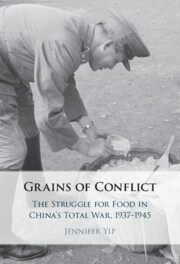Book contents
- Grains of Conflict
- Reviews
- Grains of Conflict
- Copyright page
- Dedication
- Contents
- Figures
- Tables
- Acknowledgments
- Notes on the Text
- Abbreviations
- Introduction
- 1 The Militarization of a River
- 2 The Institutions and Individuals behind Wartime Grain Management and Military Supply
- 3 Wartime Granary Networks and the “Science” of Storing Grain
- 4 Carrying “The Nation’s Thousand-Jin Burden”
- 5 The Three-Way Tussle for Food
- Conclusion
- Bibliography
- Index
3 - Wartime Granary Networks and the “Science” of Storing Grain
Published online by Cambridge University Press: 23 August 2025
- Grains of Conflict
- Reviews
- Grains of Conflict
- Copyright page
- Dedication
- Contents
- Figures
- Tables
- Acknowledgments
- Notes on the Text
- Abbreviations
- Introduction
- 1 The Militarization of a River
- 2 The Institutions and Individuals behind Wartime Grain Management and Military Supply
- 3 Wartime Granary Networks and the “Science” of Storing Grain
- 4 Carrying “The Nation’s Thousand-Jin Burden”
- 5 The Three-Way Tussle for Food
- Conclusion
- Bibliography
- Index
Summary
This chapter examines the military and economic centrality of granary networks to the Nationalists’ war effort. The centralization of land tax and its collection in kind restored the granary’s historic importance as the storehouse of state wealth. However, the chapter moves away from the dominant portrayal of granaries as economic stabilizers and disaster relief mechanisms to emphasize their strategic significance for an agrarian state at war. In examining the government’s establishment of a national grain reserve scheme and its construction of granary networks throughout its territories, the chapter presents the granary as an integral part of wartime economic policy and military logistical organization. It also studies the amassing of grain reserves in southwestern Yunnan for the Chinese Expeditionary Force after the fall of Burma, a significant but forgotten effort. Unlike most studies, it pays close attention to day-to-day operations, such as checking the quality of delivered grain and preventing spoilage. These everyday procedures are a window into how the demands of war concretely shaped civilian life and illustrate that granaries were key sites of state-society interaction.
Keywords
Information
- Type
- Chapter
- Information
- Grains of ConflictThe Struggle for Food in China's Total War, 1937–1945, pp. 107 - 149Publisher: Cambridge University PressPrint publication year: 2025
Accessibility standard: WCAG 2.0 A
Content Navigation
Allows you to navigate directly to chapters, sections, or non‐text items through a linked table of contents, reducing the need for extensive scrolling.
Provides an interactive index, letting you go straight to where a term or subject appears in the text without manual searching.
Reading Order & Textual Equivalents
You will encounter all content (including footnotes, captions, etc.) in a clear, sequential flow, making it easier to follow with assistive tools like screen readers.
Visual Accessibility
You will still understand key ideas or prompts without relying solely on colour, which is especially helpful if you have colour vision deficiencies.
You benefit from high‐contrast text, which improves legibility if you have low vision or if you are reading in less‐than‐ideal lighting conditions.
